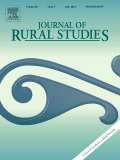
Journal of Rural Studies
Scope & Guideline
Shaping the Future of Rural Studies
Introduction
Aims and Scopes
- Rural Development and Policy:
Exploration of frameworks and policies impacting rural communities, including agricultural policy, land use planning, and rural economic development. - Sociocultural Dynamics:
Analysis of the social, cultural, and political factors influencing rural life, including migration, identity, and community resilience. - Sustainability and Environmental Issues:
Research on sustainable agriculture, environmental governance, and the socio-ecological challenges faced by rural areas, including climate change adaptation. - Innovations in Agriculture and Technology:
Investigation of the role of technology and innovation in agricultural practices, including precision agriculture, digital farming, and agroecological methods. - Health and Wellbeing in Rural Contexts:
Studies focusing on health disparities, mental health, and wellbeing among rural populations, particularly in relation to agricultural practices and rural livelihoods. - Gender and Social Equity:
Examination of gender dynamics and social inequalities in rural settings, including women's empowerment and the impact of social capital on rural development. - Food Systems and Security:
Research on local food systems, food sovereignty, and the implications of agricultural practices for food security and nutrition in rural areas. - Community Engagement and Social Innovation:
Exploration of grassroots initiatives, participatory approaches, and community-led development strategies in rural contexts.
Trending and Emerging
- Climate Change and Adaptation:
Increasing research on how rural communities are adapting to climate change impacts, focusing on resilience-building strategies and sustainable agricultural practices. - Digital Transformation in Agriculture:
A surge in studies exploring the implications of digital technologies in agriculture, including precision farming, data sharing, and e-commerce for rural development. - Social Innovations and Community Development:
Growing interest in social innovation as a means to address rural challenges, highlighting community-led initiatives and participatory governance models. - Mental Health and Wellbeing in Rural Areas:
Emerging focus on the mental health and wellbeing of rural populations, particularly in relation to the stresses of agricultural life and community dynamics. - Food Sovereignty and Local Food Systems:
An increasing trend towards examining local food systems, food sovereignty, and the role of community-supported agriculture in enhancing food security. - Gender and Rural Development:
Heightened attention to gender issues in rural contexts, emphasizing women's roles in agriculture, decision-making, and community resilience. - Rural Resilience and Crisis Recovery:
Research on resilience and recovery strategies in the wake of crises, including economic downturns and pandemics, has gained significant traction.
Declining or Waning
- Traditional Agricultural Practices:
There is a noticeable decrease in research centered on conventional farming methods, as the focus shifts towards sustainable, innovative, and technology-driven approaches in agriculture. - Rural Tourism:
Interest in rural tourism has declined, possibly due to the increasing emphasis on sustainability and local food systems over traditional tourism models. - Rural-Urban Migration:
Research on rural-urban migration appears to be less prevalent, as the journal pivots toward examining the dynamics of rural revitalization and community resilience. - Economic Development Models:
There is a diminishing focus on traditional economic development models that prioritize growth at the expense of social and environmental considerations, as newer frameworks emphasizing sustainability gain traction. - Crisis Management in Agriculture:
While still relevant, the frequency of studies addressing crisis management specifically within agricultural contexts has decreased, likely overshadowed by broader themes of resilience and adaptation.
Similar Journals
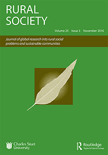
Rural Society
Transforming Perspectives on Rural Tourism and HospitalityRural Society, published by Routledge Journals, Taylor & Francis Ltd, is a prominent academic journal dedicated to exploring the complexities and dynamism of rural communities. Since its inception in 1991, the journal has served as a critical platform for advancing interdisciplinary research in the fields of tourism, leisure, and hospitality management, particularly in the context of rural societies. With an ISSN of 1037-1656 and an E-ISSN of 2204-0536, Rural Society has carved out a niche within the Q3 category of Scopus rankings, reflecting its commitment to high-quality research despite its positioning in the 26th percentile among its peers. This journal is vital for researchers, practitioners, and students alike, offering valuable insights into sustainable practices, social dynamics, and economic development within rural settings. While it does not currently offer open access, Rural Society continues to foster academic dialogue and innovation, providing readers with access to crucial findings that directly inform policies and practices impacting rural life.
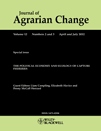
Journal of Agrarian Change
Exploring the Dynamics of Agrarian TransformationsJournal of Agrarian Change is a premier academic journal published by WILEY, dedicated to advancing the understanding of agrarian studies within the fields of anthropology, archaeology, and environmental science. With an impressive convergence of scholarly contributions since its inception in 2001 and extending through 2024, the journal proudly holds a Q1 ranking in Anthropology and Archaeology, reflecting its commitment to high-impact research. With an ISSN of 1471-0358 and an E-ISSN of 1471-0366, the Journal strives to foster interdisciplinary dialogue and innovation, providing a reputable platform for researchers, professionals, and students alike. Although it currently does not offer open access, the journal's extensive reach and significant citation metrics, evidenced by its high Scopus rankings—such as Rank #12 in Social Sciences & Archaeology and Rank #19 in Anthropology—underscore its vital role in shaping discourse on agrarian change. The Journal of Agrarian Change is essential reading for those seeking to explore the intricate relationships between social, cultural, and environmental dimensions of agrarian systems.

Ager-Revista de Estudios sobre Despoblacion y Desarrollo Rural
Connecting Research with Rural RealitiesAger-Revista de Estudios sobre Despoblacion y Desarrollo Rural, published by PRENSAS UNIV ZARAGOZA, is a distinguished academic journal focused on the critical fields of demography, rural development, and geography. With an ISSN of 1578-7168 and E-ISSN of 2340-4655, this journal serves as a vital resource for researchers, professionals, and students dedicated to understanding the dynamics of population decline and sustainable development in rural areas. The journal has gained recognition for its quality, evidenced by its placement in the Q3 category across multiple domains in the 2023 rankings, including Demography, Development, and Geography, Planning and Development. Additionally, it holds impressive Scopus ranks, notably at 48th percentile in Demography and 78th percentile in Anthropology. With contributions from eminent scholars and practitioners, Ager not only disseminates high-quality research but also nurtures discourse on policy implications and innovative solutions for rural challenges. The journal is open access, fostering broad accessibility and encouraging scholarly dialogue in the critical study of population and rural development. Whether you are a seasoned researcher or an emerging scholar in the field, Ager provides a platform for impactful insights and collaboration in tackling pressing rural socio-economic issues.
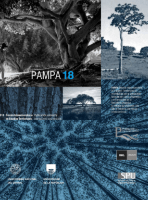
Pampa
Advancing Knowledge: Unveiling the Rich Tapestry of the Pampas Region.Pampa is a distinguished academic journal dedicated to the exploration and dissemination of research across various disciplines, with a special focus on regional studies and environmental issues prevalent in the Pampas region of Argentina. Published by EDICIONES UNL, this open access journal has been providing researchers, professionals, and students with vital insights and current developments in the field since its inception in 2005. With its ISSN 1669-3299 and E-ISSN 2314-0208, Pampa prioritizes accessibility and visibility, ensuring that scholarly work is freely available to a global audience. Researchers are encouraged to submit their findings and contribute to the ongoing dialogue within this vibrant and critical area of study. By promoting open access to significant research, Pampa enhances collaborative efforts and fosters innovation within the academic community.

WORLD DEVELOPMENT
Transforming global perspectives on development.WORLD DEVELOPMENT is a prestigious peer-reviewed journal published by Pergamon-Elsevier Science Ltd, renowned for advancing the field of global development studies. Established in 1973, this influential journal dives deep into the interconnected realms of economics, sociology, political science, geography, and planning, aiming to provide critical insights and innovative solutions to complex global issues. With an impressive impact factor and a Q1 ranking across multiple disciplines, including Development and Economics and Econometrics, WORLD DEVELOPMENT ranks among the top journals in its field, ensuring high visibility and engagement for contributors. Researchers, professionals, and students engaged in development studies will find WORLD DEVELOPMENT an invaluable resource, as it publishes rigorous empirical research, theoretical discussions, and policy analysis that both informs and challenges prevailing paradigms. The journal remains committed to fostering a comprehensive understanding of development processes worldwide, making it an essential platform for knowledge exchange in this critical domain.

Journal of Agricultural Extension
Fostering Collaboration for Agricultural ExcellenceThe Journal of Agricultural Extension serves as a premier platform for the dissemination of innovative research and practices in the field of agricultural extension, playing a crucial role in enhancing agricultural development and education. Published by the AGRICULTURAL EXTENSION SOCIETY OF NIGERIA and boasting an Open Access policy since 2012, this journal aims to increase accessibility to vital information that supports agricultural professionals and researchers. With ISSN 1119-944X and E-ISSN 2408-6851, it encompasses a wide range of topics pertinent to agricultural sciences, education, and development, with its articles contributing to informed practices that uplift rural communities. Although currently categorized in the Q4 quartile across various fields, its commitment to enhancing knowledge export and collaborative research is evident, as it seeks to improve its global standing by 2024. The journal's commitment to quality research makes it an indispensable resource for students, professionals, and researchers dedicated to advancing agricultural practices in Nigeria and beyond.
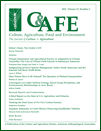
Culture Agriculture Food and Environment
Innovating Dialogue on Food Systems and Cultural PracticesCulture Agriculture Food and Environment, published by WILEY, is an esteemed journal that serves as a pivotal platform for interdisciplinary research at the intersection of cultural studies, anthropology, and agricultural sciences. With its ISSN 2153-9553 and E-ISSN 2153-9561, this journal aims to foster scholarly dialogue on the complex relationships between food, culture, and environmental sustainability. As of 2023, it proudly holds a Q2 ranking in Agricultural and Biological Sciences and Anthropology, as well as a Q1 ranking in Cultural Studies, indicating its significant impact within these disciplines. Researchers and professionals will appreciate its rigorous peer-review process and diverse coverage, which extends from 2011 to 2024, reflecting ongoing debates and innovations in the field. Although open access options are not provided, the journal's commitment to advancing knowledge in understanding food systems and cultural practices makes it a vital resource for academics and practitioners alike, promoting a deeper understanding of the cultural dimensions of agriculture and the environment.

Cuadernos de Desarrollo Rural
Cultivating Insights into Rural Development StrategiesCuadernos de Desarrollo Rural, published by the PONTIFICIA UNIVERSIDAD JAVERIANA in Colombia, is an essential academic journal that serves as a pivotal platform for discourse in the fields of Agronomy, Economics, and Geography. With an ISSN of 0122-1450 and an E-ISSN of 2215-7727, this journal has been contributing to the body of knowledge since its inception in 2008. Although its impact factor and H-index are not available, its current Scopus ranking reflects a growing presence in the academic community, situated in the Q4 category for Agronomy and Crop Science and Economics and Econometrics, while achieving Q3 in Geography, Planning and Development. The journal is committed to advancing research and policy discussions that address rural development challenges in Latin America and beyond. Through rigorous peer-reviewed articles, it aims to foster an understanding of sustainable practices in agriculture and economic development, making it a valuable resource for researchers, professionals, and students dedicated to these critical issues.

Agricultura Sociedad y Desarrollo
Advancing Sustainable Practices for a Resilient SocietyAgricultura Sociedad y Desarrollo is a renowned journal published by COLEGIO POSTGRADUADOS, focusing on the intricate relationship between agriculture, society, and sustainable development. With an ISSN of 1870-5472 and an E-ISSN of 2594-0244, this journal plays a critical role in disseminating cutting-edge research and practical insights essential for advancing agricultural sciences and fostering community resilience. Although Agricultura Sociedad y Desarrollo is not open access, its commitment to quality ensures that the materials published meet rigorous academic standards, promoting innovation and collaboration among researchers, policymakers, and practitioners. Positioned in the heart of Mexico, the journal highlights regional agricultural challenges while contributing to global discussions on sustainable development. With the growing emphasis on integrating social sciences in agriculture, this journal stands out as a vital source of knowledge and discussion for those keen on enhancing agricultural practices and societal development.

Economia Agraria y Recursos Naturales
Fostering Collaboration in Agricultural and Environmental ResearchEconomia Agraria y Recursos Naturales, published by UNIV POLITECNICA VALENCIA, EDITORIAL UPV, is a prominent open-access journal that has been serving the fields of agricultural and biological sciences, environmental science, and geography since 2001. With an ISSN of 1578-0732 and an E-ISSN of 2174-7350, this journal is dedicated to publishing high-quality research that contributes to the sustainable management of natural resources and agricultural practices. The journal invites scholars, practitioners, and students to explore and share innovative findings that address pressing environmental challenges. While currently categorized in the lower quartiles (Q4) for various disciplines in 2023, its open-access model ensures wide dissemination and visibility for authors and their work, aligning with the growing trend towards accessibility in academic publishing. Positioned in Spain, Economia Agraria y Recursos Naturales is a valuable resource for those seeking to engage with the intersection of agriculture, environmental studies, and policy planning within a global context.